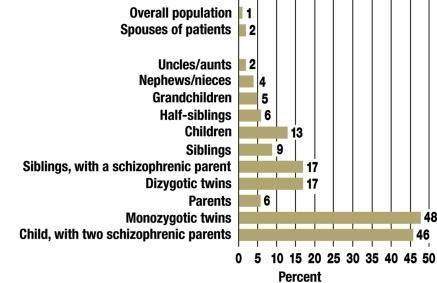Inheriting Mental Disorders
In the research of finding causes of mental disorders, scientists are connecting the dots at genetic factors. Often, we get the compliment that we look like our parents. We might have their mannerisms, physique, cleverness, attitude, or physical features. But does it relate to the fact that my parents are the reason for my anger or anxiety? Is it because I suffered a tragic loss of my brother in the growing years? Or is it written into my DNA?
The fact is, if a family member has a mental disorder, the chance of an individual having a mental disorder is higher. Even though mental illness is inherited, there may be differences in the symptoms among family members sharing the disease.
One person might have a mild case, while others will have a severe case. However, mental illness does not follow a pattern of inheritance.
Mental health is sometimes a difficult topic to talk about. Those who deal with it always looks out for a reason to avoid the discussion.
Mental illness is not about a single gene but a collection of genes. According to a recent study, the chances of schizophrenia or bipolar disorder being carried down through family members depend on the type of mental illness and severity. See the table below-
| Schizophrenia | Bipolar | |
| Lifetime chance (the chance of someone in the general population developing the condition during their lifetime) | 1 in 100 | Bipolar |
| If one of your biological parents has the condition | 13 in 100 | 2-30 in 100 |
| If both of your biological parents have the condition | 45 in 100 | 15 in 100 |
| If your brother or sister has the condition | 9 in 100 | 50 in 100 |
| If your identical twin has the condition | 40-50 in 100 | 40 – 70 in 100 |
| If your non-identical twin has the condition | 10-15 in 100 | 20 in 100 |
| If a second degree relative has the condition (for example, your aunt, uncle or grandparent) | 3 in 100 | 5 in 100 |
Always remember the chances of not developing a mental illness even though it runs in your family is high, then chances of developing one. The table clarifies that the chances of not developing bipolar are 97 out of 100. That’s on the positive side.
Source: https://www.rethink.org/advice-and-information/carers-hub/does-mental-illness-run-in-families/
The Intersection Of Mental Illness And Inheritance
- Epigenetic Regulation: This affects how a person perceives and reacts to environmental patterns and may contribute to mental disorder. Epigenetics is not a constant one. It goes on and off over time — a right combination of epigenetic regulation and environmental factors are responsible for a mental disorder to develop.
- Genetic Polymorphisms: Polymorphisms found in our DNA make us unique as an individual. It alone may not lead you to mental illness. However, the combination of many specific polymorphisms and environmental factors can lead to the development of a mental disorder.
For example, in addiction, genetics plays a significant role in knowing whether someone is likely to develop an addiction or not. But there are a lot of other things that one should consider–like the environment, mental health history in your family, and complications you might have. Parents who have experiences with mental disorders in the past can help children equipped with solutions when they see the first symptoms.
The Risk
The probability of developing a specific mental disease is high when a biological parent or other related family members have the same condition. Researchers are working extensively to find patterns in twins and adopted children. The risk of developing schizophrenia is 1% in the population, but the risk is ten times higher if a parent suffers from the illness. The chance increased to about 40% if both parents have schizophrenia.

The lifetime risk of schizophrenia is correlated with the degree of relationship to the patient (first-degree relatives are at higher risk than second-degree relatives)
Source: https://www.ncbi.nlm.nih.gov/pmc/articles/PMC2696847/
How Can Parents Work on Mental Health Challenges?
- Talk to your child: You may feel a little anxious before taking this issue up. But speaking openly about mental health issues and your story is an invaluable way to reduce the risk of passing the illness to your child. Make your children aware of your behavior, how difficult you feel sometimes, and how they can help you overcome those challenges together as a family. There’s no shame in feeling depressed or anxious. Explain to them don’t blame anyone. Children often internalize their parent’s moods. This will lay a foundation for them to stand with strength when they walk down the same mental health path in their life.
- Inculcate healthy exercise: Try and incorporate daily exercising and meditation sessions in your family wellness program. It helps to boost your therapy while improving your child’s concentration and memory. Explain to them how the treatment is helping you improve your disease. Your kids will learn at the early stage how it is essential to take care of mental and physical health equally.
- Don’t fear but teach: It is common that those with mental health issues fear of passing the illness to their kids. There is a genetic element to many mental disorders. Please don’t shy away from the fact that there are chances that they might not inherit them. There are so many factors that you don’t have control over. Right now, you have the power to create the most supportive and nurturing environment for your kids, where they can talk openly to you and share their challenges.
- Stop Punishing Yourself: You have both good and bad days while going through mental health issues. Honestly, parenting is challenging, and it can trigger mental health issues. Do not ignore these signs and, if possible, take a break and divert your energy on your mental condition. When your kids are aware of your situation, they will understand and help overcome those periods.
There’s no hidden fact that mental health issue is a tough topic, and we all have a fear of passing them to our children. But believing in fear and creating an overprotective environment might pull your kids away, affecting your conditions. It’s better to talk about the situation with your doctor. Learn how you can bring this topic with your family and build a support team, not just for yourself but for your future generations. Unlike yesterday, we are having a healthy discussion on mental health. As we see, more solutions and support are coming forward to help people suffering from mental health disorders live a healthy and fuller life.







